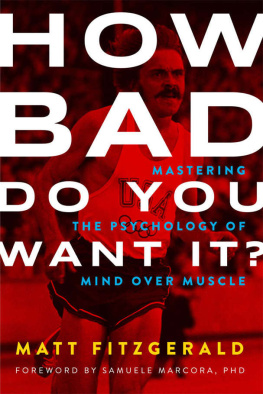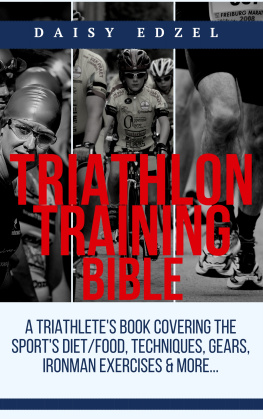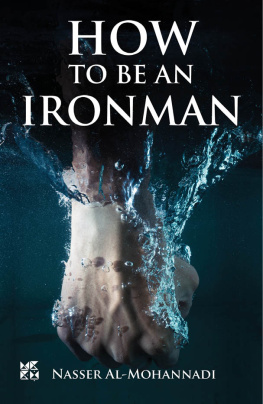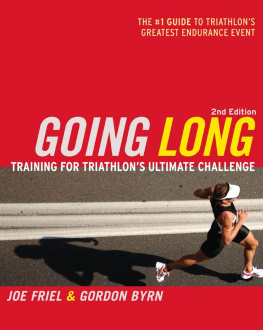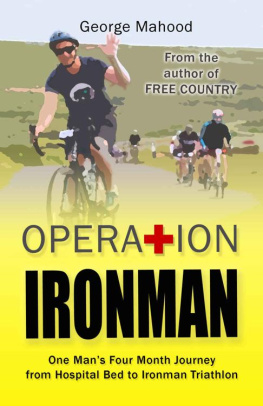
Copyright 2017 by Matt Dixon
All rights reserved. Published in the United States of America by VeloPress.
Ironman is a registered trademark of World Triathlon Corporation.

3002 Sterling Circle, Suite 100
Boulder, CO 803012338 USA
VeloPress is the leading publisher of books on endurance sports. Focused on cycling, triathlon, running, swimming, and nutrition/diet, VeloPress books help athletes achieve their goals of going faster and farther. Preview books and contact us at velopress.com.
Distributed in the United States and Canada by Ingram Publisher Services
The Library of Congress has cataloged the printed edition as follows:
Names: Dixon, Matt (Exercise physiologist), author.
Title: Fast-track triathlete : balancing a big life with big performance in long-course triathlon / Matt Dixon.
Description: Boulder, Colorado : VeloPress, [2017] | Includes index. | Identifiers: LCCN 2017039559 (print) | LCCN 2017039609 (ebook) | ISBN 9781937716943 (ebook) | ISBN 9781937715748 (pbk. : alk. paper)
Subjects: LCSH: TriathlonTraining. | TriathlonPhysiological aspects.
Classification: LCC GV1060.73 (ebook) | LCC GV1060.73 .D54 2017 (print) | DDC 796.42/57dc23
LC record available at https://lccn.loc.gov/2017039559
Art direction by Vicki Hopewell
Cover design by Nate Baltikas
Cover and interior photographs by Jeff Clark
v. 3.1
A note to readers: Double-tap on illustrations, tables, and training plans to enlarge them. After art is selected, you may expand or pinch your fingers to zoom in and out.
Contents
Triathlon is a complex and uniquely challenging sport. It demands a high degree of overall fitness and proficiency in three distinct disciplines that require a lot of sophisticated gear, and it necessitates relentless drive, focus, and many hours of training. Not surprisingly, the sport draws ambitious individuals whose lives are already rich with commitments to their careers and families. Those people seem to have a genuine desire to pursue big goals in Ironman and Ironman 70.3 races.
Although anyone can enter triathlon at a casual or recreational level, to truly achieve success and continually improve in the sport takes ongoing commitment. You need a focused mindset and pragmatic adaptability to train and race while also performing at a high level at your workplace, within your family and social circles, and in your community. Thats often much easier said than done, especially for people who are time starved before they even get started.
The reality is that in many cases, the pursuit of triathlon becomes all-consuming, especially when you are training for an Ironman triathlon. Youve probably experienced this firsthand or witnessed it in friends or training partners, individuals who try so hard to achieve their goals in triathlon that the rest of their lives suffer. They become fully invested in the sport; they sign up for a race, buy the gear, and start training only to find themselves overwhelmed and falling behind, both in training and other aspects of their lives. They invest still more time and energy in training, but it only leads to fatigue and anxiety. Suddenly theyre not performing as well at work, theyre not sleeping or eating well, and they become more susceptible to illness. There might even be added tension with a significant other or family members. Amid this mounting pressure, these athletes continue to push themselves beyond their limits regardless of the detrimental effects.
I found myself in a similar scenario in my athletic pursuits as an elite swimmer and professional triathlete. When I reflect on my career, it is clear that I had a very strong work ethic, and I made it my mission to try to outwork my competition. Although I made the finals of the Olympic Swimming Trials, and I won a couple of professional races over the course of my triathlon career, I underperformed relative to my potential and ultimately burned out. The cause of my underperformance came down to the simple truth that I didnt have a comprehensive approach to training. Despite my educational background in exercise physiology as well as experience coaching collegiate-level swimming, I didnt structure my workouts correctly, and I didnt optimize my endurance training with the essential building blocks of success: strength, conditioning, nutrition, and recovery. I now refer to those four key areas as the pillars of performance because regardless of your experience, you must nurture and develop all of these areas to succeed as an athlete. They have become the baseline educational tools and program framework for all Purple Patch athletes.
Im here to tell you there is a more realistic, sustainable, and life-affirming path to success. Best of all, it will actually help you overcome challenges in the rest of your life, too. It doesnt require you to maximize the number of hours you spend training during any given week. Instead, it is rooted in optimization of available hours. The goal is to attain the highest amount of quality training you can fit into your week while also maintaining high performance in the other important areas of your life. Your best training recipe might lead you to consistently log fewer hours of training most weeks, but the mission will be for those training hours to be very effective. It is all determined by what works for you.
Having coached multiple professional and age-group world champions and dozens of highly successful amateurs who live extremely busy lives, Ive been able to develop a comprehensive framework and methodology that integrate triathlon training and racing into a full life. I wrote Fast-Track Triathlete for anyone looking to create and execute a sustainable plan for success. I will show you how to plan proactively, make pragmatic decisions and adjustments over the course of your training, and eliminate or scale workouts when necessary without compromising your key sessions. Ive used the same framework and philosophy outlined in this book to help hundreds of athletes achieve their long-distance triathlon goals.
Like my previous book, The Well-Built Triathlete, I wrote this book with ambitious, performance-oriented, age-group athletes in mind. However, this book is not just about training for triathlons. Training for a full Ironman or Ironman 70.3 is a metaphor for something much bigger. Yes, this book will help you solve your Ironman challenges, but the intent is to help you do so by creating a sustainable framework for training and racing that also supports your bigger goals in work and life. Ultimately, I wrote this book to help you execute your Ironman goals and everything that goes with them.
Training doesnt have to become a distraction from work, keep you from being present for your family or commitments, or require you to live like a monk for several months. If you are a really busy person, your pursuit of triathlon had better be fun and bring you happiness. Otherwise, whats the point? Its possible for you to train and race in a way that improves your health and feeds your soul, thus giving you something for yourself. You can become a better version of yourself, at which point you will find that you have a greater capacity to focus and think critically at work and be better in your relationships.
Is this a controversial approach? Absolutely. It debunks the prevailing belief that triathlon has to be a selfish, exclusive pursuit that stands between you and your family and friends. Critics of my approach are obsessed, self-punishing types, and they probably arent training correctly in the first place. Theyre single-mindedly chasing something unattainable and definitely unsustainable. This mindset can bring down so many triathletes, making their results meaningless in the greater context of life.
Next page

